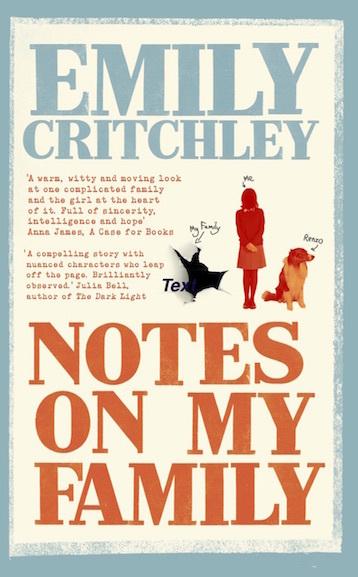 After a wonderful reception for last week’s piece on the Veneto by Elise Valmorbida, I’m delighted to welcome Emily Critchley, the second author from my Summer Reads 2018 line-up, to discuss a subject of particular interest to me and I’m sure to many of you. Over the years I have enjoyed and featured many novels with a coming of age theme or teenage characters, some marketed as Young Adult (YA), most as general adult fiction and occasionally, as with Emily’s debut Notes on my Family, as ‘crossover’ titles aimed at both markets. (A separate adult edition is due out on 4 July.)
After a wonderful reception for last week’s piece on the Veneto by Elise Valmorbida, I’m delighted to welcome Emily Critchley, the second author from my Summer Reads 2018 line-up, to discuss a subject of particular interest to me and I’m sure to many of you. Over the years I have enjoyed and featured many novels with a coming of age theme or teenage characters, some marketed as Young Adult (YA), most as general adult fiction and occasionally, as with Emily’s debut Notes on my Family, as ‘crossover’ titles aimed at both markets. (A separate adult edition is due out on 4 July.)
I’ve been reflecting on the strong appeal of adolescence in fiction; I’m currently writing a third novel featuring teenage characters and they add something essential. As a time of turbulent emotional and physical change adolescence is a rich source of the drama and conflict all good stories need, and regardless of our age as readers, we all have experience of growing up. Decades later, my own children grown up/nearly, I find it fascinating how profoundly the events and relationships of those years can reverberate through the rest of our lives.
It was immediately apparent on reading Notes on my Family why Emily’s publishers, small independent Everything With Words, feel this book speaks to adults as well as teenagers – in my review at the end you can find out why, but first Emily gives us the author’s view:
When I began writing Notes on My Family I wasn’t thinking about whether I was writing a book for adults, or YA fiction, or a crossover novel. I was simply writing a novel. I knew I wanted to write a darkly humorous book about a dysfunctional family living a seemingly ordinary suburban life.
I began the book writing from the point of view of Lou, aged thirteen and a half, the youngest member of the Coulson family. I quickly fell in love with her quiet struggles, her resilience and the unique way she sees the world. I originally planned to write from the point of view of each family member but after beginning with the youngest, I decided to stick with Lou. Her voice was strong and unusual and it seemed clear to me that this was going to be her story.
I finished writing Notes on My Family when I was twenty-nine and the novel was published after I turned thirty. I once had a creative writing tutor who used the phrase ‘never write in fresh blood’. With my twenties only just behind me it made sense that I look further back and draw upon my experiences as a teenager. Although Lou isn’t anything like me and her family certainly aren’t mine, I was bullied at school and I used some of my own experiences in the novel. I’ve always enjoyed coming of age literature along with novels and films centred around teenage protagonists. Writing from the point of view of a thirteen year-old girl came quite naturally to me and having a young teenage protagonist provided a lot of potential for humour, drama, and character growth.
I was offered representation for Notes on My Family before the novel was complete, something which is fairly unusual for a debut author. I had made contact with my now agent, Chloe Seager, when I submitted a different novel to the agency the year before. They didn’t take that particular book but Chloe did like my writing and we stayed in touch. When Chloe began to build her own list, concentrating on YA and children’s fiction, she asked me if I was working on anything and I mentioned Notes on My Family.
After I was offered representation I realised that my novel, along with having a teenage protagonist, had many other characteristics of YA fiction: bullying at school, problems at home, a best friend storyline and coming out. We felt the book would be enjoyed by teen readers and would fit the YA category.
Notes on My Family was published in November 2017. It quickly became evident the novel was appealing to both adult and teen readers. I met with a friend of mine who’d recently read the book. Over a cup of green tea in a Waterstones cafe she told me, I loved it! But this is an adult book. The jokes are for adults…
I don’t believe in writing down to children or teenagers but I understood what she meant. Adult readers were telling me the novel had made them laugh and cry, or that they were feeling grateful they were no longer at school. It seemed I had written a crossover novel, something that could fit two categories. I had written a YA book and a funny, contemporary novel for adults. I have always enjoyed the work of humorous writers such as Sue Townsend, Nina Stibbe and Mark Haddon. These authors have all written novels about young protagonists but their work is read by adults. Writing a crossover novel means writing a novel that will be read by a broad range of people, a novel that can fit into two different categories and be marketed in two different ways, all great things for an author.
Although Notes on My Family is now classified a crossover novel, I’m still thrilled it fits the YA genre, that teens are reading the book and hopefully taking something away from it. I think it’s important teenagers are able to see themselves reflected in the books they read as well as being able to follow their own literary paths. Our teenage years are often turbulent, they’re a time of change and of firsts. Fitting in can feel especially important. Ironically this comes at a time when many of us are still not quite sure who we are. One of the overriding themes of Notes on My Family is that it’s okay to be different. As Lou’s art teacher tells her, It’s the people who are different who make the difference. I’ve recently felt writing a novel that doesn’t fit neatly into one category perfectly suits both myself as an author and Lou, my unusual protagonist.
Thank you so much to Emily for sharing such an interesting perspective as a crossover author.

For a description of the book, click here.
This poignant, funny and recognisable take on growing up and family life was such a joy that I couldn’t wait to recommend it to my 16 year old son, my own friends and their children before featuring it here. Writing a novel with that breadth of appeal takes a lot of skill and subtlety. This book really doesn’t talk down to teenagers; on the contrary, it shows the wisdom and perceptiveness they often possess (particularly in relation to the behavior of adults!) through a variety of charged and lively scenarios. As for ‘being different’, it explores the challenge we all face of being who we are – harder for some than others – with genuine and at times overtly philosophical depth (Lou’s Camus-quoting friend Faith is a brilliant character) but also an admirable lightness of touch: it could have been heavy, it could have been trite, and it is neither. Lou’s unique and engaging voice will touch and enchant people of all ages.
Discover other recommended novels with teenage protagonists on the Literary Sofa in recent guest posts (which include my reviews) from:
Alicia Drake, author of I love you too much (Writers on Location post on Paris),
Louise Walters on writing in a young person’s voice in The Road to California
And on 27 June…
Writers on Location about Darwin by Clare Atkins, author of Between Us, another of my Summer Reads 2018.
*POSTSCRIPT*
Next week my guest will be Kerry Hadley-Pryce with a Writers on Location post on the Black Country, setting of her superb novel Gamble.
Advertisements
